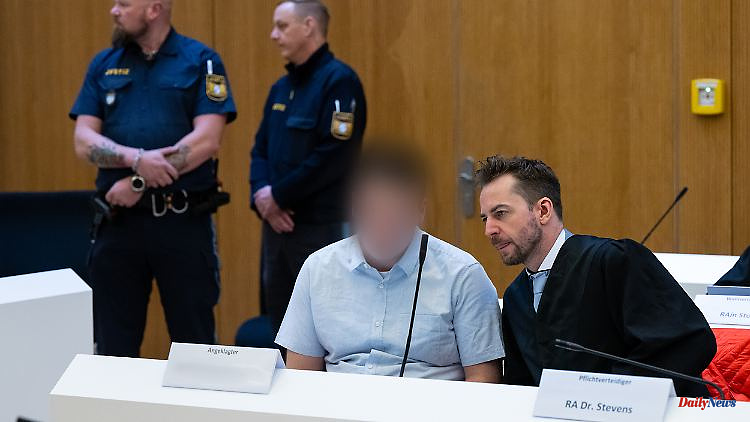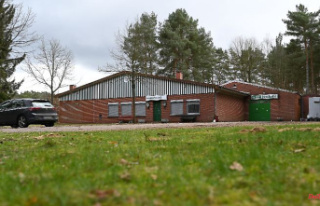Again and again there are surprising twists and turns in the trial of the killed P. family from Starnberg. While one of the two accused suddenly confessed last year, his buddy is still counting on an acquittal. The process is now coming to an end - but there are still doubts.
Why did the P. family from Starnberg have to die? Who knew about the plan to kill Vincent P.? And most importantly, who was actually involved? For a year and a half, the Munich II Regional Court has been trying to get answers to these questions. The case of the triple murder in Starnberg turned out to be one of the most spectacular trials in recent years - not only because of its length. Above all, hardly any Hollywood director could have imagined the twists and turns that this process took.
What initially looked like a family drama quickly became a crime that can hardly be surpassed in its brutality. The courtroom featured particularly tough defense attorneys, sudden confessions, and even a birthday cake for the defendant Samuel V from his defense attorneys. For months it seemed as if the case would become more confused rather than clearer for the court with each witness. Even now, shortly before the verdict is announced, all the inconsistencies have by no means been cleared up.
The starting point for the many puzzles in the courtroom is the night of January 10th to 11th, 2020 in a bright single-family house in Starnberg, Upper Bavaria. Gunsmith apprentice Vincent P. lives here with his parents. That night, all three are shot at close range. The frightening picture is revealed to the police the next morning - the daughter of the family called her because she had not heard from her parents for several days. Now the officers find the bodies of the P. couple in the bedroom. The dead Vincent P. lies in his own room, he was shot in the head. In his right hand he holds one of the two murder weapons.
Initially, the police are therefore assuming an extended suicide - the 21-year-old apprentice is said to have killed his parents first and then himself. However, when the officers also visit Maximilian B., a friend of Vincent P., during their investigation, this changes abruptly: without hesitation, the then 20-year-old confesses to the murder of his friend and his parents. And: His roommate, Samuel V., is said not only to have driven him to the scene of the crime, the then 19-year-old is also said to have been initiated into the murderous plan. The Munich public prosecutor has accused the two young men of complicity in murder. Chronically broke, they are said to be targeting the gun collection of the killed apprentice.
At first glance, this might seem like a quick process, but the planned 40 should ultimately turn into almost 80 negotiation days. The accused were silent for weeks - Maximilian B. did not initially repeat his statement about the night of the crime before Judge Regin Holstein and the lay judges. However, investigators found a large part of Vincent P.'s arsenal of weapons on him and finally a video from the crime scene appeared on his own cell phone. In it, the camera focuses on the corpse of Vincent P., covered in blood, while Maximilian B.'s voice sounds almost indifferent: "He's still breathing, hm." The scene from the master bedroom is no less disturbing. The end of the film turns off the light and whispers: "Then I'll let you sleep."
The evidence against B. is overwhelming. Around seven months after the start of the trial, in spring 2022, the strategy of defending the 22-year-old finally changed. He makes a confession. Maximilian B. admits everything the public prosecutor alleges in court: the triple murder and that he and V. wanted to sell Vincent's weapons. They would have hoped for proceeds of 400,000 to 600,000 euros. B. also puts a heavy burden on his friend Samuel V., the alleged initiate. For example, the idea of making the act look like a suicide is said to have come from him.
In one point, however, his confession differs from the prosecution. So he shot his buddy not only out of greed, but above all to prevent a killing spree. Because Vincent was about to cause a massacre in the "Pasing-Arcades" in Munich, explains B.'s lawyer Gerhard Bink, as reported by the "Süddeutsche Zeitung". The rampage theory came up early in the process. A testimony from the best friend of the mother who was killed at the beginning of the trial pointed in the direction of Alexander Stevens, the lawyer for the co-defendant Samuel V., in an interview with ntv.de. So the mother knew something because of which she could be killed.
At the time, the lawyer also referred to the descriptions of the youth welfare office about Vincent P. "This reads like a serial killer's biography," Stevens said. P. had problems at school early on, was "extremely desolate emotionally" and found it increasingly difficult to see mistakes, according to the file. He was also noticed early on for violence against animals. As an apprentice gunsmith, he finally put together a whole illegal arsenal of weapons from dummy pistols and blanking pistols.
Even the prosecution cannot rule out a planned shooting spree by Vincent P. However, Julia Wiesenbauer emphasizes, this justifies the act "not in the slightest". In her plea a few weeks ago, she spoke of a veritable execution of the parents. She demands 13 years and six months in prison for the accused - plus the reservation of further preventive detention. The fact that the fine for B. is not higher than that for V. is probably also due to his cooperation strategy.
Maximilian B. and Samuel V. are said to have planned the crime together. They were good friends, their clique called themselves "Idiots from Lake Starnberg" on Whatsapp. B. was really adored by V., who was a year younger, Stevens said at the time. He saved it as "Big Brother" on his cell phone. Now the two are sitting together in the dock. They are barely two meters apart, with only their lawyers sitting between them. However, their defensive strategy could not be more different.
In contrast to B.'s defense, V.'s lawyers are counting on their client's acquittal. Rather than cooperating with prosecutors, Stevens and his colleagues cast doubt on the charges from the beginning of the trial. They present about a dozen alternative crimes and submit so many requests for evidence that this already looks like a delay in the process for some of those involved in the process. Stevens, on the other hand, talks to "Bayern 3" about their defense strategy, for which they "had to turn every stone".
Your strategy is the presumption of innocence. Because not V., who hardly contributed anything to the process, has to prove his innocence, but the state has to prove the guilt of the 21-year-old. If only the slightest doubt remains, the court must acquit V. And that's what Stevens and his colleagues are all about.
In their pleading a few days ago, they saw for hours on the strongest evidence that the prosecution has against their client: B's statement. Because B. lied again and again during the investigations and the process, adjusted his statements to the status of the process and "burdened him more and more heavily" out of pure self-interest. Then the lawyer asks the simple but all-important question: Can the court affirm with deepest conviction that V. knew about his friend's murder plan when he drove it to the P. family's house?
It will probably be the most difficult assessment that judge Holstein and the jury have to give. Because despite 80 days of trial and around 50 witnesses, questions remain unanswered and doubts remain in the Starnberg triple murder. To this day, it has not been possible to clarify exactly why the P. family had to die on the night of January 11, 2020. Nevertheless, the verdict is now imminent. This ends one of the most spectacular cases of recent years - at least in the first instance.












